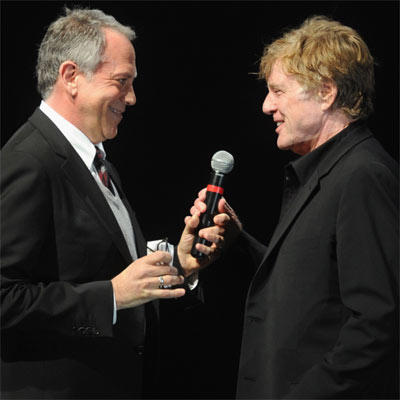New York, NY — Sundance Institute today announced that it has established a first-of-its-kind Tennessee Williams Award to honor emerging playwrights who have participated in its Theatre Program Labs. Permission was given by The University of the South, the beneficiary of the Williams’ estate.
The first Tennessee Williams Award will be presented at a benefit for the Institute’s Theatre Program, April 8, 2013 in New York. The event will feature a private musical performance at a downtown venue, followed by dinner, live performances and the award presentation. The Theatre Program’s first New York benefit, in 2012, featured a private performance of An Iliad, a solo piece written by Denis O’Hare and Lisa Peterson, followed by dinner on the terrace of The Bowery Hotel and performances by Theatre Program alumni Christine Ebersole and Scott Frankel (collaborators on Grey Gardens), as well as Jeanine Tesori and Georgi James (collaborators on Fun Home).
Keri Putnam, Executive Director of Sundance Institute, said, “Over the past three decades, our Theatre Program has inspired, encouraged and supported many of the leading theatre artists and storytellers. This event unites our community to celebrate that work and raise funds to support future projects.”
Philip Himberg, Artistic Director of the Theatre Program, said, “As an independent artist with a singular point of view, Tennessee Williams inhabits much of what Sundance Institute holds dear. The body of his work is timeless and diverse, and his legacy indelible. He was a risk-taker, true to his own creative impulse. In that spirit, we will present the Tennessee Williams Award to an emerging playwright each year with similar ambition, artistic sense and potential.”
Tennessee Williams was an American writer who worked principally as a playwright in the American theater. From the mid-1930s until his death in 1983, Williams created many plays that are regarded as classics of the American stage and adapted much of his best known work for the cinema, including A Streetcar Named Desire (1948) and Cat on a Hot Tin Roof (1955). He is acknowledged as one of the most accomplished playwrights in the history of English-speaking theater. Himberg had the distinction of knowing and working with Williams in 1978 at Playwrights Horizons.
The Theatre Program has been a core component of Sundance Institute since its founding by Robert Redford in 1981. The Theatre Program identifies and assists emerging theatre artists, contributes to the creative growth of established artists, and encourages and supports the development of new work for the stage. Under the supervision of Himberg and Producing Director Christopher Hibma, the Theatre Program has emerged as the leading play development program in the United States. Titles such as Spring Awakening, An Iliad, I Am My Own Wife, The Good Negro, Circle Mirror Transformation, Passing Strange, Grey Gardens, Crowns and Marie Antoinette have gone from Theatre Program Labs to production from coast to coast and internationally, garnering multiple Pulitzers, Tonys, Obies and other recognition. The Theatre Program hosts a range of creative Labs throughout the year and around the world, including the Theatre Lab at the Sundance Resort, Fall Lab for musicals and ensemble-generated projects and Playwrights Retreat at Ucross. The Theatre Program’s East Africa initiative is the only professional program of its type on the continent, offering Labs, cross-cultural exchange, mentorship and exposure to artists in six African countries. Past activities have also included Theatre Labs at White Oak and Governors Island in New York.
Sundance Institute relies on the generosity of donors who share a commitment to nurturing new artists, supporting unique and diverse creative voices, and furthering the reach of independent feature and documentary films around the world. The benefit will raise crucial funds to offset the non-profit Institute’s year-round programs for artists, including Labs, grants and the Sundance Film Festival.
The Sundance Institute Theatre Program is made possible by generous support from The Andrew W. Mellon Foundation, Time Warner Foundation, the National Endowment for the Arts, The Shubert Foundation, Cindy Harrell Horn and Alan Horn, LUMA Foundation, Karen and William Lauder, and The Harold and Mimi Steinberg Charitable Trust.
Visit the events site at http://www.sundance.org/celebrateNY. For information on benefit event tickets and tables or sponsorship opportunities, contact celebrate@sundance.org.
Sundance Institute
Founded by Robert Redford in 1981, Sundance Institute is a global, nonprofit cultural organization dedicated to nurturing artistic expression in film and theater, and to supporting intercultural dialogue between artists and audiences. The Institute promotes independent storytelling to unite, inform and inspire, regardless of geo-political, social, religious or cultural differences. Internationally recognized for its annual Sundance Film Festival and its artistic development programs for directors, screenwriters, producers, film composers, playwrights and theatre artists, Sundance Institute has nurtured such projects as Born into Brothels, Trouble the Water, Beasts of the Southern Wild, Amreeka, An Inconvenient Truth, Spring Awakening, Light in the Piazza and Angels in America. Join Sundance Institute on Facebook, Twitter and YouTube.
The University of the South, Beneficiary of the Williams’ Estate
Tennessee Williams, American playwright and two-time Pulitzer Prize winner, left his estate to The University of the South, familiarly known as Sewanee, as a memorial to his maternal grandfather, the Reverend Walter E. Dakin, who studied at Sewanee’s School of Theology in 1895. This generous gift, which came to the University in 1996, included the copyrights to the plays, screenplays, poems, letters and stories written by Mr. Williams. The Walter E. Dakin Memorial Fund is used primarily to support the Sewanee Writers’ Conference and the Sewanee Young Writers’ Conference, both of which support writers and encourage creative writing as contemplated by Mr. Williams’ will. More than 500 writers have been provided financial assistance to attend the Sewanee Writers’ Conference. Additional information about both Conferences is available on the University’s website: www.sewanee.edu and at www.sewaneewriters.org. The Fund also supports scholarships for students who wish to pursue creative writing and fellowships which are granted annually to budding playwrights or authors. Those fellows include Ann Patchett, Claire Messud, Tony Early, and Mark Richard. The Tennessee Williams Center houses the University’s theater department and a portion of the Fund supports the department and the theatrical productions it mounts in the Center. Those productions include works of Tennessee Williams Fellows and Mr. Williams’ own plays. The Fund also supports the creative writing program in the University’s School of Letters. Because the income stream from the licensing of the copyrights will stop as the copyrights expire, the University has set aside a portion of the Fund as permanent endowment thus insuring that Mr. Williams’ gift will benefit writers for years to come.




